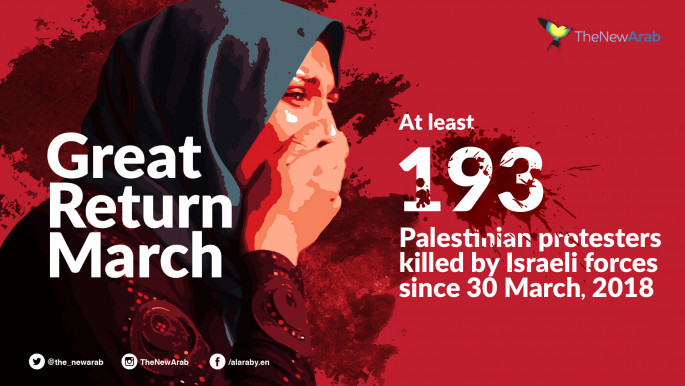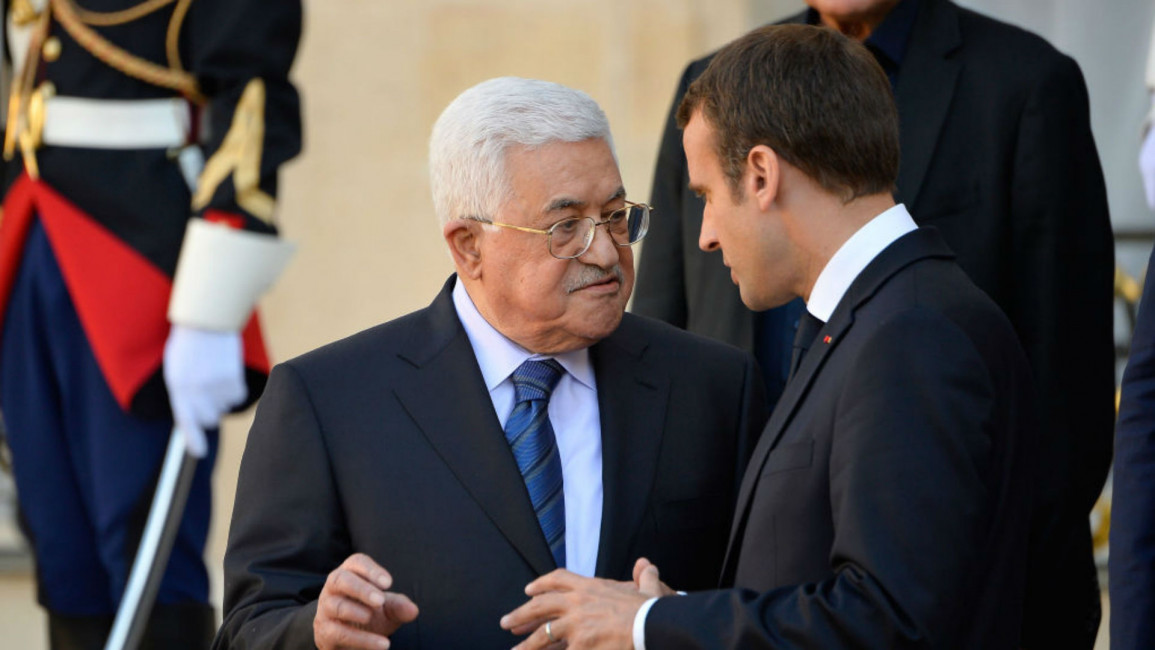
For real liberation, free Palestine of its third parties
The constant obsession with looking outwards for purported solutions has resulted in complete dissociation between the internationally-recognised leadership, and its people.
Consequently, Palestine is divided into two main camps: The Palestine pertaining to the Palestinian people, their history, memory and collective struggle, and the Palestine of 'third parties'. This Palestine started with the early Zionist colonisation in the late 1880s, and is the political innovation that has become the priority of Israel, the Palestinian Authority and the international community.
Third parties supported the Zionist colonisation of Palestine and the Palestinian leadership is requesting "an urgent intervention of a third-party like Europe, in particular France", according to PLO Executive Committee Member Hanan Ashrawi. Recent US stances have contributed to this necessity, Ashrawi said during a meeting in Ramallah with the French Deputy Diplomatic Counsellor, Aurélien Lechevallier.
In September, France said it was "studying" the possibility of recognising the State of Palestine. Mere days after Ashrawi's statements, French President Emmanuel Macron declared that France would propose its own peace plan if the US was not forthcoming following the Midterm elections.
 |
The two-state discourse, engineered externally and adopted by the PLO as the 'only solution', has taken precedence over Palestinian visibility |  |
According to Ashrawi, the US' unilateral recognition of Jerusalem as Israel's capital, the transfer of the US embassy from Tel Aviv to Jerusalem, the defunding of the United Nations Relief and Works Agency for Palestine Refugees (UNRWA) and the vague diplomatic discourse regarding US President Donald Trump's 'deal of the century' - all of which are clearly third party interventions - should be countered by additional third party intervention.
This reasoning excludes several factors and historical precedents.
The PLO's excessive focus on international law and institutions eliminates the fact that the international community always placed Palestine at an irreparable disadvantage. A case in point is the Peel Commission Plan (1937) and subsequently the Partition Plan (1947), from which the two-state paradigm can trace its origins.
Twitter Post
|
It excludes a long history of Palestinian anti-colonial struggle and the Palestinians' ability to determine their aspirations from within their own communities.
Third party involvement also excludes the articulation of the Palestinian Right of Return from a Palestinian perspective.
In more recent history, it is obvious that Ashrawi's suggestions are not a novelty. Rather, they build upon decades of Israeli colonial expansion and international insistence that Palestinians remain subjugated to institutions while relinquishing their rights.
The Palestinian Authority, in particular, has endorsed this framework, blatantly putting forth suggestions of international deployment to manage Palestinian affairs.
In 2014, PA leader Mahmoud Abbas had proposed NATO troops in the event of a future demilitarised Palestinian state."The third party can stay. They can stay to reassure the Israelis, and to protect us."
In June 2018 after Israel injured and killed Palestinians participating in the peaceful Great Return March protests, the international community adopted a resolution to protect Palestinian civilians that was as short lived as its announcement.
 |
Where are the Palestinians in the EU's framework ? |  |
More recently, reports have attested to the ongoing collaboration between the PA and the Central Intelligence Agency (CIA) in matters related to security services, and to the detriment of Palestinian opposition to Abbas' authoritarian rule.
The PLO's acceptance of the two-state paradigm cannot be ignored in the context of such discourse. Marking a departure from anti-colonial struggle, to accepting being shackled by unfavourable diplomatic demands, the two-state discourse, engineered externally and adopted by the PLO as the "only solution", has taken precedence over Palestinian visibility.
 |
|
Palestine is infested by international impositions to the point that diplomats promote the endorsed illusion that there is no Palestine without a third party framework.
Two years ago, the two-state compromise was declared obsolete across the diplomatic community, yet it remained present in the discourse of the international community and the PA. Palestine's Ambassador to Belgium and the EU, Abdul Rahim al-Farra recently stated that the bloc's recognition of Palestine is important "to save the two-state solution".
 |
Palestinians remain subjugated to institutions while relinquishing their rights |  |
The European External Action Service succinctly describes third party engagement as a process that vanquishes the people from the equation. "The EU's objective is a two-state solution with an independent, democratic, viable and contiguous Palestinian state living side-by-side in peace and security with Israel and its other neighbours."
It is pertinent to ask, where are the Palestinians in the EU's framework and why does the EU not favour an objective that is based on the Palestinian people's demands?
Since the earliest manifestations of the colonisation process, Palestinians have been politically divested of their right to the land by third party impositions. It was third parties that decided upon partition, recognition of Israel, the refusal to act against Israeli colonial violence, the upholding of Israel's so-called right to defend itself, and the erasure of Palestinian memory.
The creation of the PA merely consolidated third-party interference at a local level, without the endorsement of the Palestinian population.
With the spotlight on the negotiators rather than the people, it is easy to discern that the concoctions for Palestine that are mapped out during meetings and assemblies are far removed from the Palestinian people's realities.
This has resulted in a situation where the two-state compromise has eclipsed Palestinians themselves in terms of importance associated by the international community and the PA.
Third party involvement in Palestine has divested Palestinians of their land and rights.
Neither Europe, nor individual countries - in this case France - will reverse this political approach. What, therefore, is the PLO calling for? There seems to be a collective effort towards saving a process that has undoubtedly been lucrative for the actors involved at the cost of indigenous impoverishment and gradual elimination.
 |
Palestinians have been politically divested of their right to the land by third party impositions |  |
Since the Oslo Accords, Palestinian rights have been eroded by the PA and the international community, to pave the way for illusory peace-building and, as a result, annihilate any possibility of a Palestinian solution from within.
The situation now is that of an unrecognisable land, devised by third parties, to accommodate the calculated, profitable visions of a complicit international community, while the PA festers within its own illusions of power.
Palestinians and their voices should be at the helm, leading the international community to their vision of Palestine, without the need for third-party narratives.
Ramona Wadi is an independent researcher, freelance journalist, book reviewer and blogger specialising in the struggle for memory in Chile and Palestine, colonial violence and the manipulation of international law.
Follow her on Twitter: @walzerscent
Opinions expressed in this article remain those of the author and do not necessarily represent those of The New Arab, its editorial board or staff.




